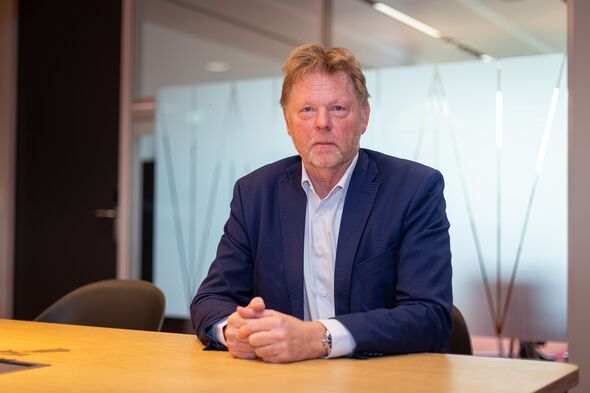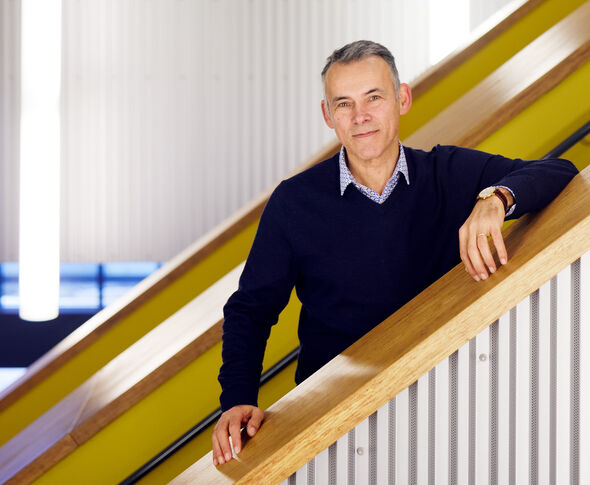
Lecturers help create tomorrow's education
That something has to change in the way we offer education is a given, as many lecturers at TU/e are fully aware. Indeed, they have been proposing stacks of projects to experiment with new approaches, all eligible for funding. Some may well come to nothing, and others may only be suited to a particular department. "No problem," says Fred Gaasendam, BOOST program manager. "We see these projects as being the first steps towards new forms of education that translate digital innovation from theory into practice and may have the potential for adoption across the university.”
Plans for innovative education projects involving ICT are clearly not lacking. At present, following two 'calls', thirty-four widely ranging projects have been approved by the steering group that oversees the implementation and progress of the BOOST program plan, which stands for Be the Owner of your Own STudy. The steering group's members include Lex Lemmens, Dean of the Bachelor College, and Paul Koenraad, Dean of the Graduate School. With the abolition of the basic grant and the introduction of the government's loan system, the Ministry of Education, Culture and Science (OCW) has released institutional funding by the name of studievoorschotmiddelen to support these projects financially.
Justifiably, the University Council and a student sounding board have taken it upon themselves to look carefully at whether the funding really is being channeled into projects that improve the quality of education at TU/e. “It is not the intention that this money be used to plug all kinds of holes in the budget relating to matters that have nothing to do with improvements in education,” says student of Biomedical Engineering Arthur Nijdam, who is both a member of the University Council and has a seat on the sounding board. “Other universities, by contrast, have attempted something of this kind.”
Vision 2030
How much money is involved? BOOST program manager Fred Gaasendam says that before the end of this year one million euros will have been spent and in the coming years expenditure will increase to two million a year. Alongside Gaasendam, Hans Cuypers, professor at Mathematics and Computer Science, is involved in this program, as an ambassador. As well as maintaining a network, it is his job to publicize the program's aims and results, both within and beyond the university. “The vision document looking ahead to TU/e in 2030 states that we want to base our education model on challenge-based learning, but we still need to investigate what this exactly means for TU/e. To a lecturer this is just words, but how are we going to make this happen in the coming years, and once we have successful projects can we adapt them for use throughout the university?” says Cuypers.
According to Cuypers, the final decision as to which projects are allowed to start will be made by the members of the steering group in cooperation with representatives of the Eindhoven School of Education (ESoE), Education & Student Affairs (ESA) and the ICT department. “They will be able to consult experts, for example, to check whether we would be developing something that already exists at another university. This is an area in which Antoine van der Beemt of the ESoE, for example, is very knowledgeable. After all, you don't want to find you have made something that was already available,” says Gaasendam.
Living lab
Every project will be evaluated after one year. “We have an obligation to perform to the best of our ability, and even if, in the end, a project doesn't deliver anything, it will have been a learning experience,” says Gaasendam. He continues, “The findings must be properly recorded and in such a way that this information is readily available to other lecturers running a project or planning to do so. In this respect, there's no doubt that BOOST resembles a living lab.” Cuypers adds, “It really is a bottom-up program and it gives us the chance to experiment over the next four to five years with projects that aim to innovate our education and make it digital.”
If in time it becomes evident that a project has the potential to be applied throughout the university, the steering group will submit it to the TU/e's education focus group (de onderwijstafel). This central consultative body examines which matters deserve priority and whether something would be worth upscaling, and whether the funding this requires is available. “It means that the projects we launched after the summer vacation must be realistic; no one gets an entirely free rein to start just anything,” says Cuypers.
Startup phase
According to program manager Gaasendam, the first twenty-five projects resulting from the first call are now in the startup phase. “The project leaders are looking for the people and materials they need. The individuals who submitted the plans, lecturers and professors, are doing this alongside their regular commitments. It creates a lot of extra work, but we can't help noticing that there's no shortage of volunteers prepared to invest their time in this way. People recognize this as being something the academic staff themselves need to be actively tackling.” Cuypers has this to say: “These days our academics are not only deeply committed to their research, but also increasingly to education. In fact, this started with the introduction of our Bachelor College some ten years ago. We've always had enthusiastic lecturers, but now the need to innovate education is being more widely appreciated,” says Cuypers.
The name BOOST was originally chosen to indicate that TU/e was keen to trigger an acceleration in this area, Gaasendam explains, “and that really has happened. As the program manager, I never fail to ask the individuals involved whether they really have the time for this. And they do, because each and every one of them finds their project immensely enjoyable. We are also seeing that education and research are drawing closer together. Lecturers are keen to address matters in the bachelor's phase that students will only encounter once they are in the master's phase. This is possible due to the development of, say, virtual labs, where students can gain their first experience while still studying for their bachelor's.”
These days our academics are not only deeply committed to their research, but also increasingly to education
The variety of projects, in terms of content, duration and funding, is considerable. Some will run for a couple of months, but there are others that will take two months. According to Gaasendam and Cuypers, even short, rapid projects can have a big impact. By way of example, Gaasendam mentions a project at Mechanical Engineering. “It will involve working with digital homework assignments that students have a given number of weeks to complete. This might sound old-fashioned, but the team is keen to study whether this method helps raise the exam grade. In fact, students will only be admitted to the exam if they have attained a certain average for their homework assignments. The intention is that students discuss the assignments with one another and see where they made errors. If after that a student is still puzzled, they can ask the lecturer. If this project is successful, it could mean the end of interim testing across the whole university. This is something the steering group would then look at.”
Teacher assistant
According to Gaasendam, over time all the exchanges these projects generate between project leaders, ESA staff, the ICT department and purchasing will lead to the emergence of a group of people who have acquired considerable expertise with the digitalization of education. Gaasendam: “And it is vital that it does, because the digitalization of education is here to stay. So, over the coming five years, with the aid of BOOST, we need to build up this kind of team. This will bring the TU/e services much closer to the primary process as a new role emerges, that of the 'teacher assistant'. This involves supporting lecturers as they take their education digital.” According to Cuypers, these specialists will be a regular presence in the departments; they certainly won't be stationed centrally. Gaasendam also points out that the reorganization of the educational support two years ago, the TOO operation, proved very positive in this respect. Now, in one fell swoop you can do business with people spread out all along the education chain.“
The digitalization of education is here to stay. So, over the coming five years, with the aid of BOOST, we need to build up a support team with experts
Setting BOOST in motion is already impacting the way education is offered here and there within the university, says Cuypers. “Courses are already being offered differently, students are already encountering new software tools. Applied Physics has a laser lab that is not without its hazards for students at work. Now they have developed a virtual laser lab where students can work with VR goggles. Here, they don't run the risk of burning a hole in their hands, but they still learn how to handle a real laser in future.”
According to Gaasendam, it certainly isn't the case that the digitalization of education at TU/e is only now getting underway with the advent of BOOST. “This is something we have been working on for a long while now, in various ways, including initiatives in the field of blended learning. We spent four years working on that and with BOOST we are building on the experience we gained.”
Student input
After the first call, a relatively large number of projects were received from the Department of Electrical Engineering. "But with the second call, we could see that this imbalance has already corrected itself and there's a better spread across the whole university,” Gaasendam says. What is still lacking at the moment, however, are projects put forward by students. This too is something Gaasendam and Cuypers plan to address. “We are busy setting up a competition, complete with a jury to choose the best project,” says Cuypers. “Having said that, if four projects are submitted, and one of them wins, it doesn't mean we'll abandon the other three. If the proposals are good, we'll move forward with them.”
BOOST and the Code of Conduct
When in March of this year the University Council gave the BOOST program plan a positive recommendation, the councilors imposed a condition. Namely that it be laid down in a Code of Conduct that the data gathered about individual students over the course of the projects, 'learning analytics' as it is called, would not be used for any personal assessments.
Program manager Gaasendam saw to it that a Code of Conduct (this link is only accessible via the TU/e intranet) was compiled and this past Monday October 21st the code was positively evaluated by the members of the University Council. An important source of inspiration for this code, reports Gaasendam, was the University of Edinburgh, where a data protection policy already exists governing the responsible handling of databases. “Incidentally, the policy that Edinburgh has introduced goes further than ours because it applies to all the data people work with at this Scottish institution. Our code is limited to the data collected during the BOOST projects. But eventually we would like to have a similarly overarching data protection policy for the whole of TU/e. If we were to draw up such a policy for all Dutch universities wearing our VSNU hat, that would be even better. After all, students are increasingly following parts of their program at other institutions. And this means you need the assurance that all institutions are handling your data in the same way.”
University Council member Arthur Nijdam concurs. “A code like this should also make it clear what happens when someone violates it. What would be the consequences for that person?”
Gaasendam says that for BOOST projects focusing on learning analytics, it might be wise to set up separate advisory groups to study what is and is not permissible. “Four things will need to be considered. Purpose limitation; what is the purpose for which I will be using this data. Data minimalization; exactly which data will I use. Storage limitation; I will save these data for a limited period only. Accountability; before I start I am completely transparent about what I will do.”



Discussion